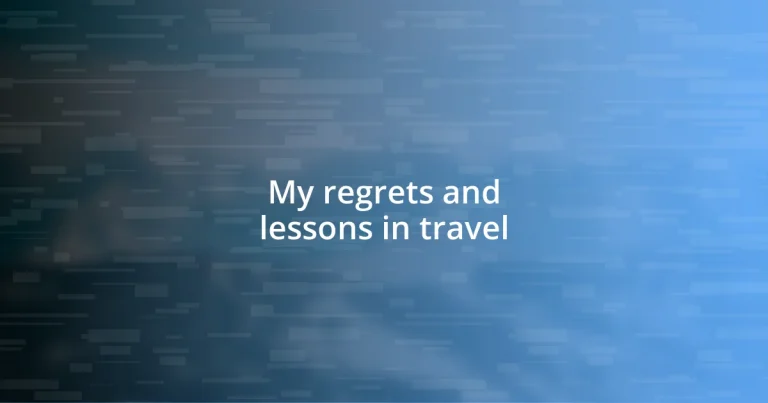Key takeaways:
- Travel regrets often arise from missed opportunities and can serve as valuable lessons that encourage spontaneity and deeper connections with local cultures.
- Common misconceptions about travel include the belief that budgeting sacrifices experience, meticulous planning is necessary, and adventure only exists in distant locations—embracing local experiences can yield deeper connections.
- Flexibility in travel enhances experiences, allowing for spontaneous discoveries and authentic interactions, while setting personal intentions can transform the travel journey into a deeply meaningful adventure.

Understanding travel regrets
Travel regrets can often stem from missed opportunities, whether it was an impulsive decision to skip an iconic landmark or a chance encounter that I chose not to pursue. I still think about that time in Paris when I hesitated to join a local duo playing music on the streets; it could have led to a beautiful experience. Isn’t it interesting how certain moments can linger in our minds, reminding us of paths not taken?
Sometimes, the regrets are about choices made before the journey started. I remember planning a trip to Japan but not fully researching the smaller towns that lay off the well-trodden path. I still feel a pang of disappointment thinking about what I missed, like the vibrant festivals and the breathtaking scenery that tourists often overlook. How many hidden gems did I pass by simply because I followed the crowd?
Reflecting on these experiences, I realize that my regrets aren’t merely about guilt but are also valuable lessons. They teach me to embrace spontaneity, to venture beyond popular attractions, and to connect deeply with the places I visit. Have you ever returned home wishing you had taken that leap of faith? It’s a humbling thought that sometimes our greatest regrets can lead us to richer journeys.

Common travel misconceptions
Travel is often shrouded in myths that can distort our perceptions and lead to missed experiences. For example, many people believe that traveling on a budget means sacrificing comfort and enjoyment. I once traveled to Southeast Asia with this misconception, only to find that choosing local accommodations and dining options enriched my experience far beyond any luxury hotel. Local cultures often thrive in casual settings, allowing for authentic interactions I wouldn’t have encountered otherwise.
Another common misconception is that all travel must be meticulously planned. I learned this the hard way during a spontaneous trip to Italy. Instead of following a rigid itinerary, I allowed myself to wander. This led me to stumble upon a quaint little café where the owner shared stories of his family’s heritage. Planning can be beneficial, but sometimes the unanticipated moments create the most cherished memories.
Lastly, there’s a belief that you have to travel far and wide to experience adventure. I’ll never forget hiking a local trail in my hometown, which unveiled breathtaking views I had always overlooked. It seems ironic, but sometimes, the most profound experiences are right around the corner. So, what if we shifted our perspective and embraced the adventure found in everyday life?
| Common Misconception | Reality |
|---|---|
| Traveling on a Budget | Local options can enhance the experience. |
| Meticulous Planning is Necessary | Spontaneity can lead to unforgettable moments. |
| Adventure Requires Distant Destinations | Local experiences often hold the deepest connections. |

Lessons from planning mistakes
Planning mistakes often come from an overestimation of what’s necessary. I once packed an extensive itinerary for a two-week trip through Europe, convinced that every hour needed to be accounted for. The truth? I spent more time scrambling to keep to the plan than enjoying my surroundings. This taught me the importance of flexibility; I learned to leave room for serendipity in my travels.
Some key lessons from my planning mistakes include:
- Overpacking: Less is more; it frees you to explore without the burden of heavy luggage.
- Rigid Itineraries: Allow for spontaneity; sometimes the best adventures are unplanned.
- Ignoring Local Insight: Researching local advice can reveal hidden gems that no guidebook covers.
- Neglecting Rest: Don’t underestimate the need for downtime; it enhances overall enjoyment and energy for exploration.
I’ve learned that travel isn’t just about where you go but how you allow yourself to experience it. Embracing a more relaxed approach not only made my trips more enjoyable but also opened the door to unforgettable moments that I wouldn’t have had otherwise.

Importance of flexibility in travel
Flexibility in travel has transformed my experiences in ways I never anticipated. I remember one trip to Japan, where I had planned to visit all the popular temples. However, when I found myself in a small town that wasn’t on my itinerary, I took a chance and explored. That unexpected detour led me to a local festival, where I met inspiring people and tasted dishes I had never imagined. Isn’t it fascinating how some of the best stories arise from moments we don’t plan?
There’s something invigorating about letting go of a strict agenda. On a road trip through the U.S., I decided to skip a famous national park to instead chase a sunset I had spotted on the horizon. While I thought I might regret missing out, what I found was a secluded beach that created one of the most beautiful memories of my life. Those quickly made decisions remind me that travel is about feeling alive and thriving in the moment.
When you embrace flexibility, you cultivate a sense of adventure. Have you ever felt the thrill of just wandering without a destination? I recall the exhilaration of getting lost in the cobbled streets of Barcelona, discovering hidden art galleries and local tapas bars. It was as if the city itself was inviting me to explore its secrets. This type of openness not only enriches our experiences but also teaches us that the journey itself can be just as rewarding as the destination.

Embracing cultural differences while traveling
Embracing cultural differences while traveling has dramatically shaped my perspective. I vividly remember my first trip to Morocco, where the vibrant colors and fragrant spices flooded my senses. Initially, I felt overwhelmed by the differences, but as I allowed myself to fully immerse in the local culture—trying street food, learning a few Arabic phrases, and navigating the bustling souks—everything transformed. It struck me how embracing these differences not only enriched my travel experience but also fostered genuine connections with the locals.
One of my lighter regrets stemmed from a misstep at a family dinner in Italy. Faces lit up over a shared plate of handmade pasta, but I focused too much on navigating the etiquette rather than savoring the moment. I found myself hesitant to join in on discussions. However, once I put my shyness aside, laughter and storytelling flowed freely. It was in those moments of vulnerability, where I embraced their culture, that I realized the joy of shared experiences. Have you ever felt that initial discomfort that fades into pure exhilaration?
These experiences have reinforced for me that cultural differences are not barriers; they’re gateways to understanding and connection. I recall an enlightening conversation I had with a local artist in Thailand, where we discussed how art transcends language. In moments like this, I learned that every culture has unique stories worth discovering. Isn’t it fascinating how, through embracing these differences, we weave a richer tapestry of our travel experiences? Each trip has taught me that the beauty of travel lies in these intercultural exchanges, making every journey a chance to learn and grow.

Strategies for meaningful travel experiences
Finding a balance between planning and spontaneity is essential for creating meaningful travel experiences. I remember hiking in the Swiss Alps with an outlined route on my phone. Yet, when I stumbled upon a hidden trail, my curiosity got the better of me. That detour led to a breathtaking vista that wasn’t on anyone’s map. Have you ever encountered something so stunning that it changed your whole perspective? Those unexpected moments can be the most rewarding.
Engaging with locals can transform your travels. During a trip to Peru, chatting with an elderly woman in the market opened my eyes to the depth of her experiences and traditions. We shared a moment over fresh produce and her confident smile spoke volumes about resilience and joy. Have you ever felt a bond with a stranger that made you see the world differently? These connections remind me that we often carry the stories of countless lives within our own.
Another strategy I’ve found invaluable is to set intentions for my trips. Before a journey to Greece, I decided my focus would be on the art of storytelling—how locals share their histories and tales. This led me to seek out artisan shops where I not only purchased unique crafts but also listened to the artisans share their narratives. Isn’t it powerful to recognize that your intentions can shape the experiences you accumulate? By honing in on something that resonates with you, travel becomes a deeply personal and transformative endeavor.

Turning regrets into future adventures
Reflecting on my past travel regrets, I often find myself smiling at how they’ve paved the way for more enriching experiences. Take my visit to Japan, for instance. I hesitated to engage with locals due to my fear of language barriers, missing out on a chance to learn about their incredible traditions firsthand. But after that trip, I vowed to embrace every opportunity to interact, which led to unforgettable adventures, like sharing tea ceremonies that deepened my appreciation for the culture. Have you ever held back from connecting with someone, only to realize what a treasure you missed?
One of my lessons revolves around the importance of flexibility. On a road trip through Spain, I deeply regretted sticking too closely to a rigid itinerary. One evening, after being tempted by the sound of flamenco music wafting from a bustling square, I decided to throw caution to the wind. That spontaneous choice allowed me to soak up the heart-pounding energy of a local dance performance and even join in, creating memories richer than any plan I had set. Isn’t it fascinating how a slight shift in mindset can turn an ordinary journey into an extraordinary one?
Moreover, I’ve come to see mistakes as stepping stones toward future adventures. When I accidentally booked the wrong dates for a trip to Iceland, I initially panicked. But looking back, that mishap led me to discover unique opportunities available only during the off-peak season. I wandered through quiet, picturesque landscapes without the usual crowds, cultivating a sense of connection with the serene beauty surrounding me. Have you found unexpected joy in a situation that seemed negative at first? Turning those regrets into lessons not only enriches future travels—it also broadens our horizons.














